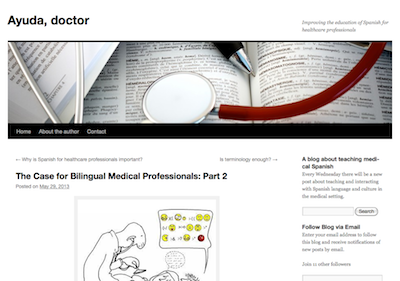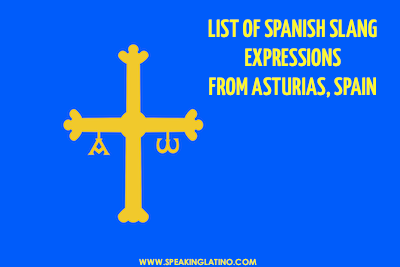 This is a guest post written by Ashley Bennink, a doctoral candidate who just completed her Masters in Teaching Spanish as a Foreign Language at the University of Oviedo in Asturias, Spain. Her area of research is the use of slang by Latino immigrants in the area of Health and Wellness. Prior to studying in Spain, she received her B.S. in Language and International Health from Clemson University and worked as a certified medical interpreter in various clinics in the United States.
This is a guest post written by Ashley Bennink, a doctoral candidate who just completed her Masters in Teaching Spanish as a Foreign Language at the University of Oviedo in Asturias, Spain. Her area of research is the use of slang by Latino immigrants in the area of Health and Wellness. Prior to studying in Spain, she received her B.S. in Language and International Health from Clemson University and worked as a certified medical interpreter in various clinics in the United States.
For those interested in medical Spanish or topics related to teaching medical Spanish, Ashley presents information, ideas and challenges related to her field on her blog, ¡Ayuda Doctor! .
¿Cómo ye en Asturias? 25 of the Most Common Words and Phrases in Asturias
by Ashley Bennink

Anyone who has lived in and traveled to various parts of Spain has had the privilege of encountering a range of lexical and phonological variants that is, well, flippante. Though it is common to hear about the difficult to understand Andalusians or the sing-songy Galicians, few hear much about the Asturians unless they visit. Despite my time in Spain and my studies, the use of the Spanish language in Asturias remained outside my linguistic awareness until I found myself living in the middle of it.
The Asturians have a playful melody to their speech that well reflects their nature but a shortness or harshness of expression that sometimes hides their friendly spirit to those not accustomed to their tendencies. Though to me it is as captivating to ruminate on their phonology as it is to listen to the birds sing in the forest, distinguishing each song from the next, what most grabs one´s attention regarding Asturian speech is not the sound of it, but the words used. In Asturias, when someone exclaims “¡Cuánto me prestas!” they are not saying that you lend a lot (of something) to them. If when planning to meet someone you are instructed to “picar el móvil” when you arrive, don´t over think it, simply give them a ring when you’re on your way.
Though one could write a small travel dictionary of slang from different parts of Asturias, below are 25 of the most common terms or phrases that you will hear on the streets. However, since there is a vast number of food related terms unique to Asturias, I have attempted to not include any in this list in order to focus on “conversational” words.
1. Me presta:
This is a term that most Asturians say is difficult to explain. Its meaning is similar to me gusta but they are not exactly synonyms. Some say it is more similar to sentar bien than gustar. Others liken it to hacer ilusión or agradar.
2.Picar:
This can be used for to knock instead of tocar: pica la puerta, or to call on the phone. Cuando llegues, me picas en el móvil y bajaré enseguida.
3. Mancarse:
Hacerse daño (hacerse daño sounds a bit cursi. If you want to say that you really hurt yourself, you could swap it out for abrasarse, which would mean “me manqué mucho”.
4. Ye:
This word comes from Bable and is not only used in spoken speech but also found on many signs that are otherwise in Spanish. Ye is simply used instead of the verb es. Likewise, yes is used instead of eres. If someone asks you: ¿Qué ye, oh? They are asking what is going on (¿Qué sucede?). Another example would be “ye difícil”.
5. Oh / Ho / O:
One of my favorites! There is a tendency to add an oh to the end of various phrases or questions (after a pause that is). It does not add or take away any meaning from the rest of the phrase. ¿Qué tal, oh? ¿Cómo ye, oh? ¿Lloverá, oh? Its part of what, to me, gives the Asturians a playful melody to their speech.
6. Orbayu:
It only takes a short stay in Asturias to fully understand this word. Orbayu is a fine, light rain. Something that defines the weather there during most of the winter and spring. In other parts of the North they would call it chirimiri, in Burgos and Navarra they tend to use chiribiri and in Madrid you may hear calabobos.
7. Chiscar:
Since we are talking about water, chiscar means to splash a bit with water (often used if you step in a puddle or a car passes by on a wet day).
8. Tajalápiz:
pencil sharpener
9. Chigre:
Chigres are important places here in Asturias because they are bars that sell cider, their typical drink. The name chigre originally comes from the name of the machine used to open the cider bottles (a rather large, complicated thing). Chigres also used to have floors covered in sawdust to help soak up the cider that was spilled as it was poured or escanceado from the bottle over the waiter’s head into the cup that is slightly below the level of his waist.
10. Culete /culín:
When cider is served, it is poured from above the waiter´s head into a glass that is held about the height of his waist. The breaking of the cider on the glass is believed to oxidize the liquid giving it a better flavor. If you do not drink it immediately after it is poured, it loses its oxidation and “dies”, so to speak. Because of this, the waiter only pours an amount that the person can drink all at once. The amount of cider that is poured is called a culín or a culete. If the waiter pours too much, it may be referred to as a culón, though this is subjective. There are typically six culines to a bottle when poured properly. However, in the cuencas mineras, there are typically four culones to a bottle.
11. Espicha:
If someone invites you to an espicha they are not inviting you to anything dangerous. An espicha is simply a meal of various pinchos, tapas or raciones (i.e. food that can be shared by a group) and cider (cider being the key factor).
12. Esi:
“Esi tío ye un tontu.” Esi is used the same as ese in Spanish.
13. Fame:
“Tengo fame” is not meant to mean that “I am famous” but to say “I am hungry”. The term should also not to be confused with faime, which means hazme.
14. Ni pa Dios:
“No vuelvo allí ni pa Dios.” Ni pa Dios means never or never again.
15. Probe:
This one simply means pobre. “Probe nenu” (Pobre neno / niño).
16. Roxu/a:
The word comes from Bable and has the meaning of rojo (red). It can be used to refer simply to the color red or a redhead. However, there is also a breed of cow that is called roxa (vaca roxa) so do not be surprised if you see it on the menu.
17. Repunante:
To be clear, it is repunante and not repuGnante. To Asturians, that letter (G) differentiates between someone who is picky and complains about everything (repunante) and someone who is disgusting or repulsive (repugnante).
18. Perres:
When buying a car, the couple selling it instructed us to “traer los perres el viernes.” They were not referring to dogs but money. Sometimes perra is used instead of perres.
19. Crianza:
If you hear someone say this in reference to another person: “No tiene mucha crianza, la probe”, they are not necessarily lamenting that they did not have much upbringing, growth or maturation. Crianza here can mean education.
20. Caleya:
As it seems, this word changes meaning depending on the part of Asturias you are in. It ranges from a narrow road to a narrow road in bad condition or a trail. In any case, if you are looking for the highway, you should not ask for a caleya.
21. Fartucase / Fartase:
This term is fairly equivalent to hartarse in Spanish or to be fed up in English.
22. Babayu:
Similar to tonto, if someone calls you this they are calling you a fool. However, it is often said in a friendly way.
23. Pigazu /pigacín:
If someone says to you: “voy a echarme un pigazu”, they are simply saying that they are going to take a short siesta.
24. Folixa:
In Spanish this word would more or less translate to fiesta, juerga or diversión. In English, a festival, a party or a fun event.
25. Fiestes de prao:
This is something you will hear often this time of year (summertime) since it means a countryside festival or a festival out in the fields.
¡Puxa Asturias! (¡Viva Asturias!)
Check out these other Spain Spanish Slang Expressions articles.